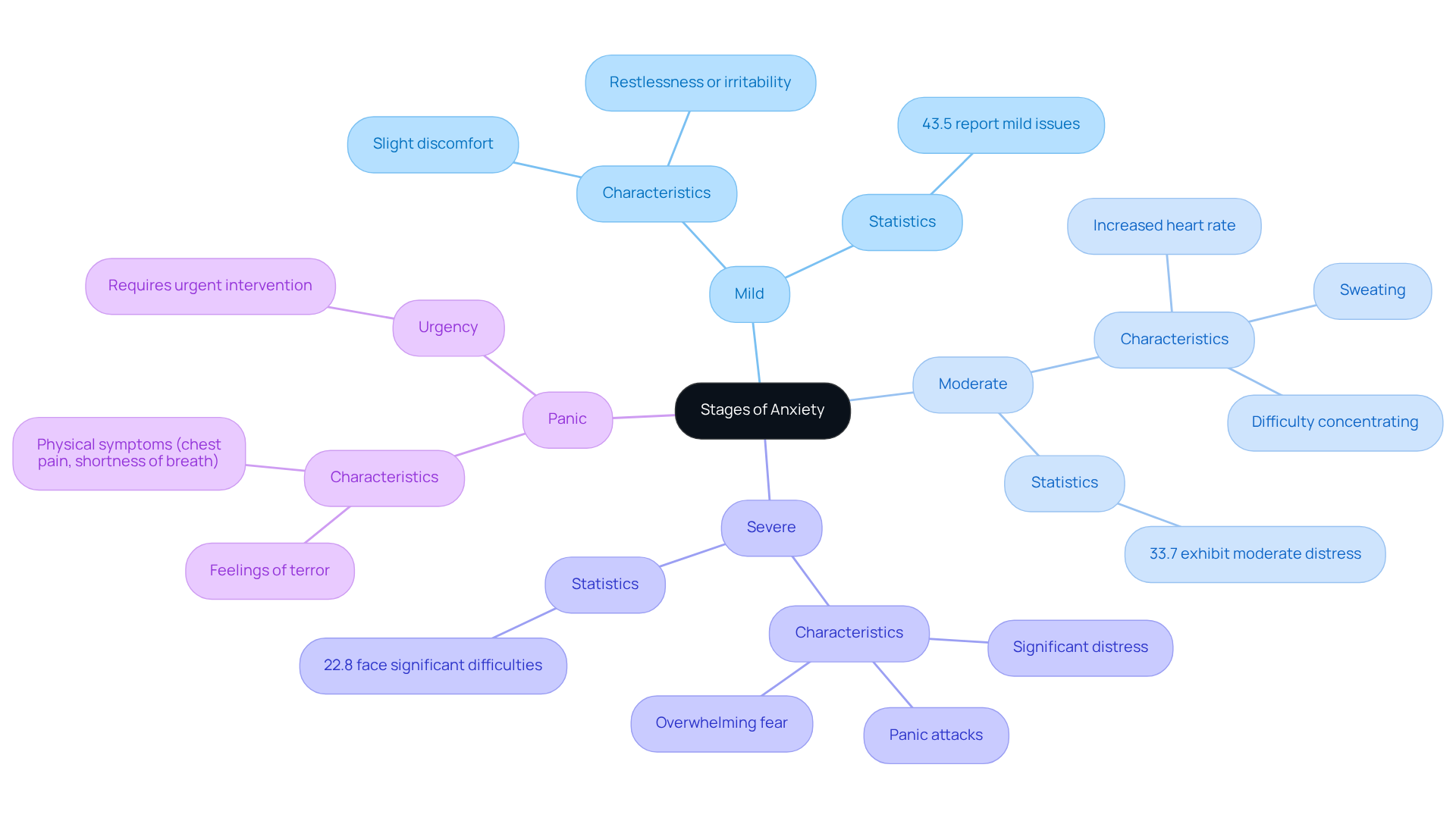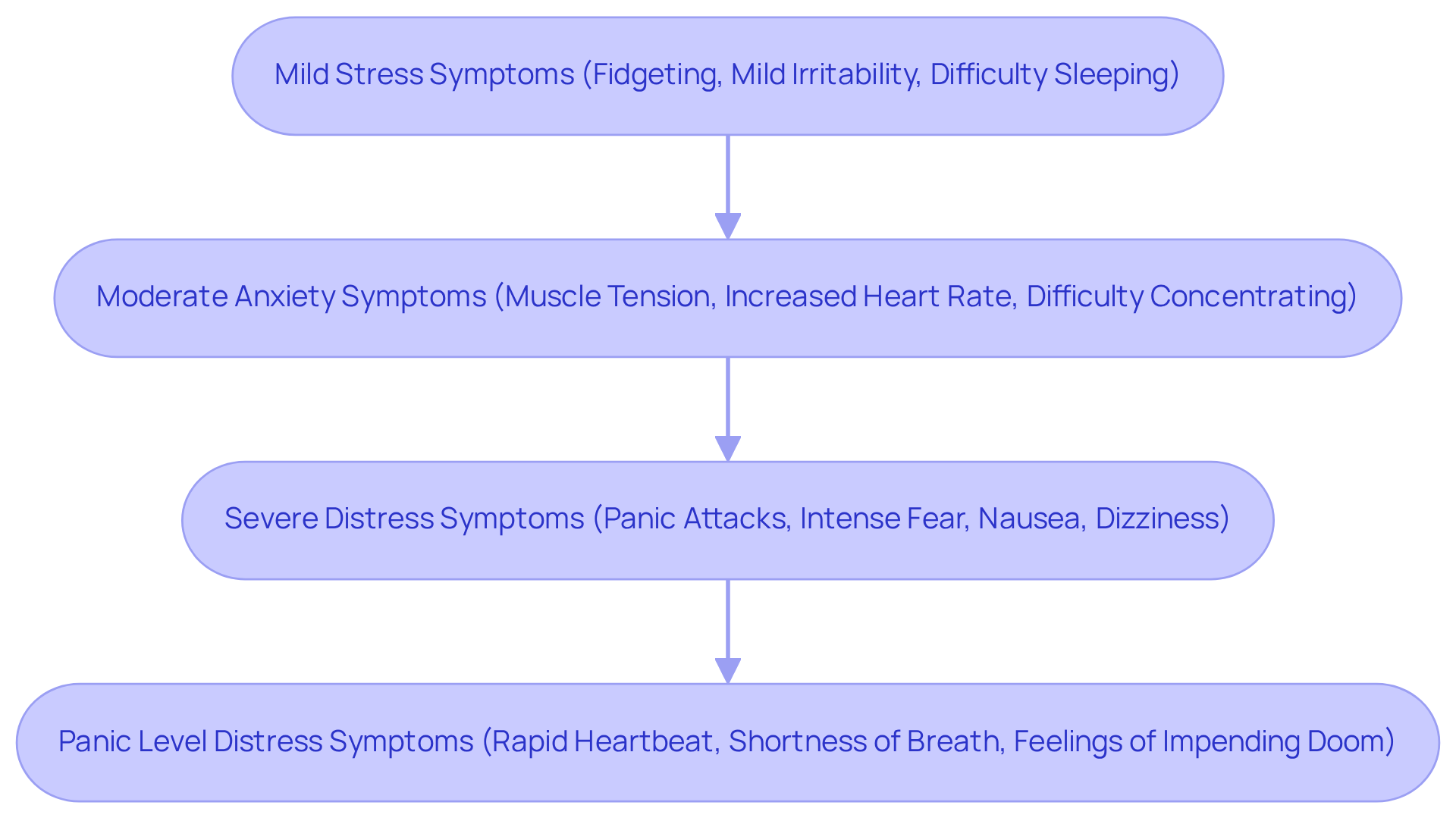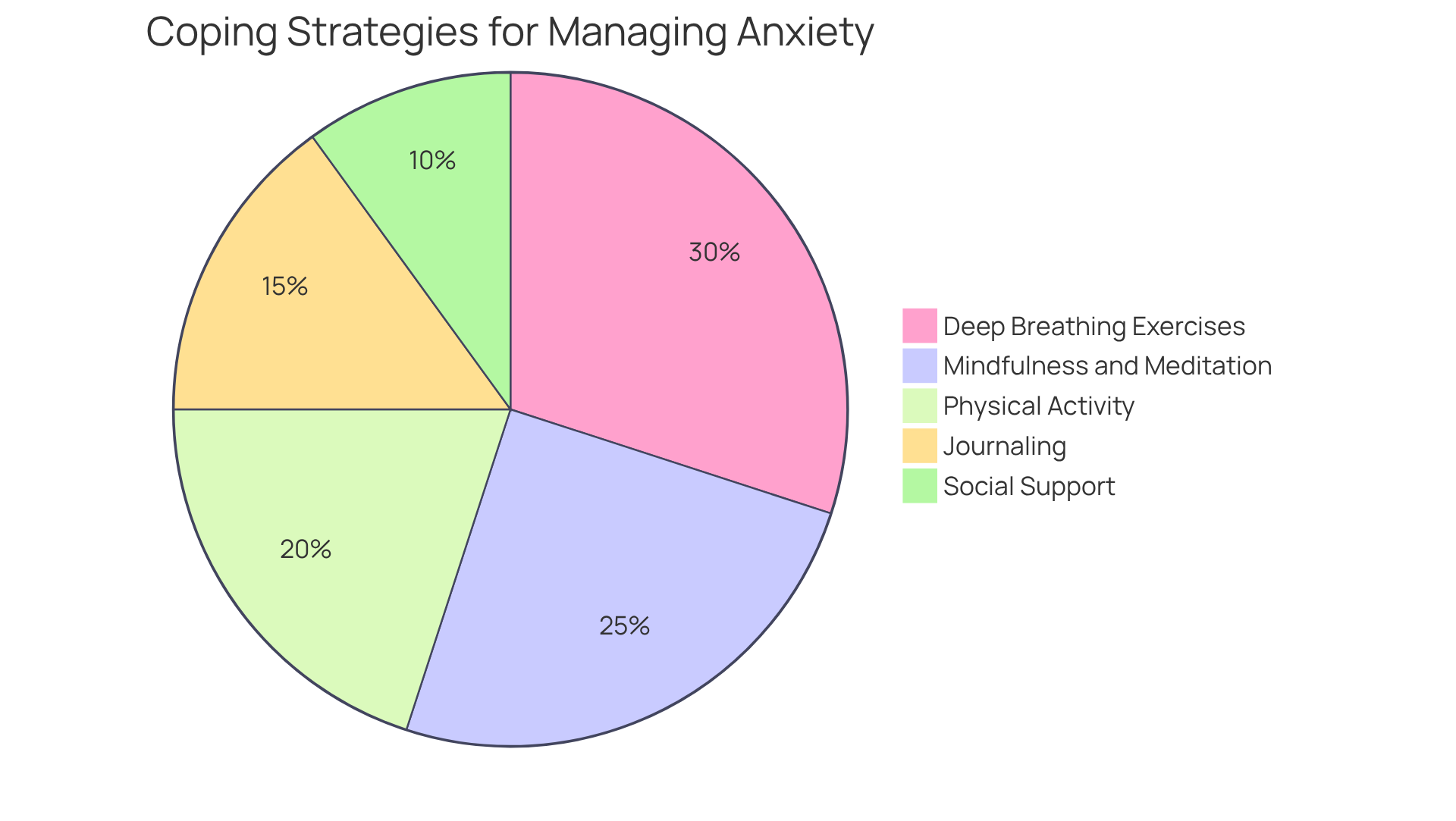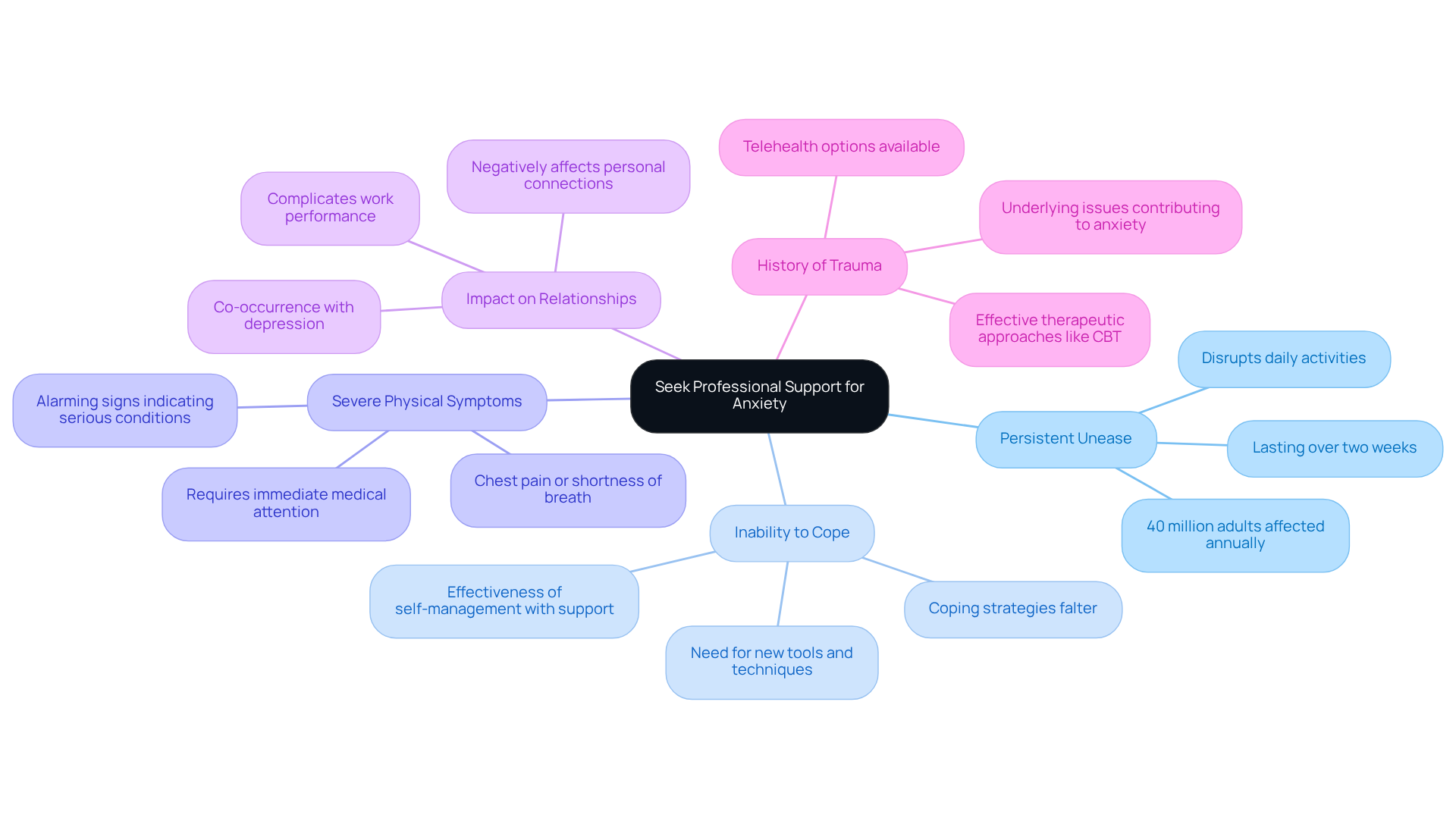Overview
The article gently outlines four distinct stages of anxiety—mild, moderate, severe, and panic—each representing varying degrees of distress and impairment. Understanding these stages is essential for effective recognition and management.
Have you ever felt overwhelmed by your emotions? It’s important to seek appropriate support during these times. Implementing coping strategies like mindfulness, deep breathing, and professional help can foster resilience and well-being.
Remember, you are not alone in this journey, and reaching out for help is a courageous step towards healing.
Introduction
Understanding anxiety is crucial in a world where millions grapple with its effects daily. The journey through anxiety can be daunting, often unfolding in four distinct stages:
- Mild
- Moderate
- Severe
- Panic
Each stage presents unique challenges and symptoms, making it essential for individuals to recognize where they stand on this spectrum. Have you ever felt overwhelmed by your past? But how can one effectively navigate these stages and determine when to seek help? As we explore this further, this article delves into the intricacies of anxiety, offering insights into its stages, coping strategies, and the importance of professional support. Together, we can empower you to take charge of your mental health.
Understand the Stages of Anxiety
Nervousness can be categorized into four distinct stages of anxiety:
- Mild
- Moderate
- Severe
- Panic
Each of the stages of anxiety symbolizes a unique degree of distress and impairment, which is vital for understanding and addressing this condition effectively.
This stage of anxiety, known as mild distress, is characterized by slight discomfort, often manifesting as restlessness or irritability. Individuals may feel a sense of unease but can still function normally in their daily activities. Did you know that approximately 43.5% of adults with anxiety conditions report mild issues? This suggests that many experience this level of unease without to their lives.
Moderate distress manifests as we explore this further, indicating that the stages of anxiety become more pronounced, leading to physical symptoms such as an increased heart rate, sweating, and difficulty concentrating. This phase impacts around 33.7% of people with anxiety-related conditions, emphasizing the necessity for awareness and coping techniques.
In the severe stages of anxiety, individuals may experience significant distress, including panic attacks or overwhelming fear. Daily functioning is frequently affected, with 22.8% of adults indicating significant difficulties due to stress. Identifying the indicators of this significant distress is crucial for prompt intervention and assistance.
Panic Level Distress is the most intense among the stages of anxiety, which can lead to feelings of terror and physical symptoms such as chest pain or shortness of breath. This stage requires urgent intervention, as it can severely affect a person's ability to cope with everyday situations.
Grasping the stages of anxiety is essential for those encountering stress. As T.S. Eliot observed, 'Worry is the handmaiden of creativity.' This implies that acknowledging and tackling worry can lead to personal growth. By recognizing their emotions and reactions, individuals can take proactive measures toward managing their stress and seeking suitable support, such as therapy or self-care techniques like deep breathing and meditation. Have you ever felt overwhelmed by your past? It's okay to seek help and take steps towards healing.

Identify Symptoms of Each Anxiety Stage
Recognizing the symptoms associated with each of the stages of anxiety is essential for effective management, and understanding the therapeutic process can enhance your journey to wellness.
- Mild Stress Symptoms: Common signs include fidgeting, mild irritability, and difficulty sleeping. Have you ever felt worried about everyday events but still managed to engage in daily activities? Approximately 9.5% of adults reported experiencing mild distress symptoms in the past two weeks, indicating that mild distress is common. At The Emerald Couch, we tailor our therapy to your needs, and many clients start to feel better or see some improvement around 4 - 6 weeks. We also offer virtual appointments for those who may need them, ensuring that support is accessible.
- As we explore the stages of anxiety further, moderate anxiety symptoms may escalate to include muscle tension, increased heart rate, and difficulty concentrating. Individuals may steer clear of specific circumstances that provoke their discomfort. Research indicates that 33.7% of adults will encounter a disorder related to stress at some time in their lives, emphasizing the commonality of moderate issues. During your intake session at The Emerald Couch, we collaboratively develop a custom treatment plan that defines what success looks like for you, fostering a sense of partnership in your healing journey.
- In the stages of anxiety, severe distress symptoms can manifest as panic attacks, intense fear, and physical symptoms like nausea or dizziness. Individuals may find it challenging to perform daily tasks. Studies indicate that those with are three to five times more likely to visit a doctor and six times more likely to be hospitalized for psychiatric disorders compared to non-sufferers. Our approach includes regular check-ins on your progress towards the goals we set together, ensuring that your treatment remains aligned with your evolving needs.
- Panic Level Distress Symptoms: Symptoms include rapid heartbeat, shortness of breath, and feelings of impending doom. Individuals may feel detached from reality and require immediate support. Panic disorder impacts roughly 6 million individuals in the U.S., accounting for 2.7% of the population, highlighting the necessity of tackling these issues. Disorders associated with worry affect approximately 40 million adults in the U.S., or more than 18 percent of the adult population, emphasizing the broader context of these conditions.
By recognizing these signs and understanding the tailored assistance offered at The Emerald Couch, you can take proactive measures to handle your stress effectively, fostering resilience and personal development. Remember, you are not alone on this journey.

Implement Coping Strategies for Anxiety Management
Managing the stages of anxiety can feel overwhelming, but compassionate coping strategies can be tailored to meet your unique needs. Have you ever felt like the weight of stress is too much to bear? Here are some gentle approaches that may help you find relief and promote well-being.
- Deep Breathing Exercises: Engaging in deep breathing techniques can be a calming balm for your nervous system. Simply inhale deeply through your nose, hold for a few seconds, and exhale slowly through your mouth. Research indicates that breathwork can significantly reduce self-reported stress and tension levels, making it a valuable tool for managing the stages of anxiety and providing immediate relief.
- Mindfulness and Meditation: Incorporating mindfulness practices can help you stay present and lessen stress. Consider utilizing apps like Headspace or Calm, which can guide you through meditation sessions. These practices have been shown to enhance among users, particularly in navigating the stages of anxiety, fostering a deeper connection with oneself.
- Physical Activity: Regular exercise serves as a powerful remedy for stress. Aim for at least 30 minutes of moderate exercise most days of the week. Research shows that physical activity can lead to notable decreases in stress symptoms, which are often associated with the stages of anxiety, ultimately enhancing your overall mental well-being.
- Journaling: Taking the time to record your thoughts and feelings can aid in emotional processing and lessen stress. Maintaining a daily journal allows you to monitor triggers and reflect on your coping achievements, promoting a deeper understanding of the stages of anxiety in your emotional landscape.
- Social Support: Don’t hesitate to reach out to friends or family members for support. Expressing your emotions can lighten the burden of stress and offer solace. Engaging with a supportive community is crucial, as it can enhance resilience and promote healing.
By integrating these strategies into your everyday life, you can more effectively navigate stress and enhance your overall well-being. Remember, you are not alone in this journey, and seeking support is a courageous step towards healing.

Seek Professional Support When Needed
Recognizing when to seek professional support is crucial for effectively managing the stages of anxiety. Have you ever felt overwhelmed by your emotions? If so, consider these important signs:
- If feelings of unease persist for over two weeks and disrupt your daily activities, it may indicate that you are experiencing different stages of anxiety, and it might be time to reach out to a mental health expert. Research reveals that stress-related disorders affect 40 million adults in the U.S. annually, yet only 36.9% receive the treatment they need. At The Emerald Couch, we specialize in addressing trauma and stress, offering tailored psychotherapy services that can help you reconnect with your needs and achieve your goals.
- Inability to cope with the stages of anxiety can occur when personal coping strategies falter and anxiety intensifies, making professional guidance necessary to introduce new tools and techniques. Many individuals discover that self-management strategies, like understanding triggers and practicing mindfulness, become even more effective with professional support. Our therapists are here to help you navigate these challenges, ensuring a personalized approach to your healing journey.
- The stages of anxiety can include severe physical symptoms, such as chest pain or shortness of breath, which require immediate medical attention. These alarming signs may indicate a more serious condition, highlighting the importance of timely intervention. At The Emerald Couch, we prioritize your comfort and safety, fostering a trusting relationship before addressing any triggering events.
- Impact on Relationships: If stress contributes to the stages of anxiety that negatively affect your personal connections or work performance, seeking assistance can foster healthier interactions and enhance your overall quality of life. Anxiety disorders often co-occur with depression, impacting nearly half of those diagnosed, which can complicate interpersonal dynamics. Our compassionate therapists are here to support you in overcoming these obstacles, guiding you toward more fulfilling relationships.
- If you have a history of trauma, consider professional support to address the underlying issues that contribute to the stages of anxiety. Therapeutic approaches, such as (CBT) and Exposure Response Prevention, have proven effective in helping clients navigate these challenges. At The Emerald Couch, we offer both face-to-face counseling and telehealth options, ensuring you receive the care that best suits your needs.
Remember, professional support may include therapy, medication, or a combination tailored to your individual needs. Seeking help is a sign of strength and a vital step toward healing, as evidenced by the positive outcomes reported by those who engage in structured therapeutic processes at The Emerald Couch.

Conclusion
Understanding the four stages of anxiety—mild, moderate, severe, and panic—offers crucial insight into how anxiety manifests and impacts daily life. Each stage represents varying levels of distress, emphasizing the importance of recognizing symptoms to manage anxiety effectively. Have you ever felt overwhelmed by your emotions? By identifying these stages, individuals can take proactive steps to address their mental health, employing coping strategies and seeking support when necessary.
This article outlines the key characteristics and symptoms associated with each anxiety stage, highlighting the prevalence of these experiences among adults. With nearly 40 million adults in the U.S. affected by anxiety disorders, awareness and education about these stages become vital. Effective coping mechanisms such as:
- Deep breathing
- Mindfulness
- Physical activity
- Social support
are essential tools that can empower individuals to navigate their anxiety. In addition to this, the importance of seeking professional help is underscored, especially when symptoms become overwhelming or disrupt daily functioning.
Ultimately, recognizing the stages of anxiety is not just about identifying distress but also about fostering resilience and personal growth. Taking steps toward understanding and managing anxiety is a courageous journey that can lead to improved mental well-being. Whether through self-care techniques or professional guidance, individuals are encouraged to prioritize their mental health and seek the support they deserve. Embracing this journey can lead to a healthier, more balanced life.
Frequently Asked Questions
What are the four distinct stages of anxiety?
The four distinct stages of anxiety are Mild, Moderate, Severe, and Panic.
What characterizes the Mild stage of anxiety?
The Mild stage is characterized by slight discomfort, such as restlessness or irritability, where individuals feel unease but can still function normally in their daily activities.
How common is Mild anxiety among adults?
Approximately 43.5% of adults with anxiety conditions report experiencing Mild anxiety issues.
What symptoms are associated with the Moderate stage of anxiety?
The Moderate stage is marked by physical symptoms like an increased heart rate, sweating, and difficulty concentrating, affecting around 33.7% of people with anxiety-related conditions.
What does Severe anxiety entail?
Severe anxiety involves significant distress, including panic attacks or overwhelming fear, and it affects daily functioning for about 22.8% of adults.
What are the characteristics of Panic Level Distress?
Panic Level Distress is the most intense stage, leading to feelings of terror and physical symptoms such as chest pain or shortness of breath, requiring urgent intervention.
Why is it important to understand the stages of anxiety?
Understanding the stages of anxiety is crucial for recognizing distress levels, prompting timely intervention, and managing stress effectively.
What strategies can individuals use to manage their anxiety?
Individuals can manage their anxiety through therapy, self-care techniques like deep breathing and meditation, and by acknowledging their emotions and reactions.




